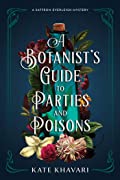A Botanist's Guide to Parties and Poisons by Kate Khavari: A review
First off, I must confess that I finished reading this book several days before I left town on my recent trip and so much has happened since then that I really find it hard to recall a lot about the plot. You might gather from that that it didn't make a lasting impression on me and you would be right in that conclusion. At the time that I finished it, I rated it as a three-star read which means that it was not terrible but not great. It was basically mediocre.
I read somewhere that this was the writer's second novel, but I can only find this one listed under her name, so I'm assuming that it was, in fact, her first. She is a Texas writer, living in the Dallas-Fort Worth area.
The time is 1923 and the place is London. Our protagonist, Saffron Erleigh, is a botanist at University College London. In this position, she is following in the footsteps of her late father. She is an assistant to Dr. Maxwell who is very supportive of her career ambitions. It's important that she has his support because she doesn't have that of her family from whom she is alienated.
The head of the botany department is Dr. Berking who is not a nice guy. He is a sexual harasser and Saffron does her best to steer clear of him whenever possible.
At a party for donors, faculty, and their spouses, Saffron meets a dishy and accomplished microbiologist named Alexander Ashton and we can sense immediately that this may develop into a romantic relationship. But also at the party, Saffron overhears a conversation detailing the many affairs of one of the professors, Dr. Henry. Soon after, she watches in horror as Mrs. Henry collapses and dies. Poison is suspected and soon confirmed.
A few days earlier, Dr. Maxwell had had an explosive argument with Dr. Henry and now he becomes the chief suspect in what is determined to have been murder. Maxwell had been scheduled to lead a large research expedition to the Amazon, but now he finds himself arrested and charged with murder. His plucky assistant, Saffron, is determined to prove his innocence and realizes she will have to do it on her own. She does however get a helping hand from that dashing microbiologist that she met earlier.
So what we have here is a romance/mystery with the emphasis a bit more on the romance side featuring a spunky and impetuous heroine. It was a quick read with a likable main character. It held my interest and certainly did not tax my brain cells; in other words, it was a nearly perfect summer read. The chapters were short and the action moved along at a steady clip. But the characters were all pretty one-dimensional and frankly, I can't even recall most of them. I know there were others besides Saffron, Dr. Maxwell, Alexander, and the Henrys, but they are only a blur to me now.
Still, not every book is Pulitzer-worthy but they can still be entertaining for a short while, if not particularly memorable in the long run. This one met those criteria.
My rating: 3 of 5 stars


Sounds like a good enough read but, not one I will rush out and get. Perfect for summer though - not a fan of over-taxed brain cells right now.
ReplyDeleteOur present hot (triple digits most days) and dry weather is certainly not conducive to anything requiring serious brain power.
DeleteWelcome back. I hope your trip was a good one.
ReplyDeleteIt was, Cathy. I got to visit with several friends and relatives and visit the graves of my parents - all things that were on my list.
DeleteEntertaining and quick reads can make for a fun summer read, even if they're not very memorable. I'm finding I need books right now that don't tax my tired brain cells too much. :)
ReplyDeleteYes, they are just the ticket for summer reading!
Delete